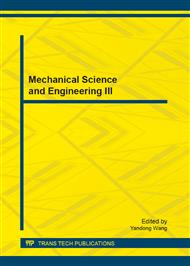p.314
p.318
p.323
p.328
p.334
p.338
p.343
p.351
p.357
Game Analysis of the Adverse Selection Formation Mechanism on Engineering Quality Risk Based on Information Asymmetry
Abstract:
The paper makes a deep analysis of the adverse selection formation mechanism under the condition of information asymmetry through the establishment of adverse selection game model in construction market. The paper seeks the root of the construction market risk based on the perspective of information economics. Due to asymmetric information, the adverse selection makes the low strength level engineering quality responsible units expel the high strength level engineering quality responsible units form the construction market , and greatly increases the risk of the construction market, which will make it difficult for construction engineering quality to be guaranteed, and lead to engineering project quality risk. The paper puts forward some effective countermeasures and suggestions to avoid construction market quality risk from both sides of the construction information symmetry angle.
Info:
Periodical:
Pages:
334-337
DOI:
Citation:
Online since:
June 2013
Authors:
Price:
Сopyright:
© 2013 Trans Tech Publications Ltd. All Rights Reserved
Share:
Citation:


